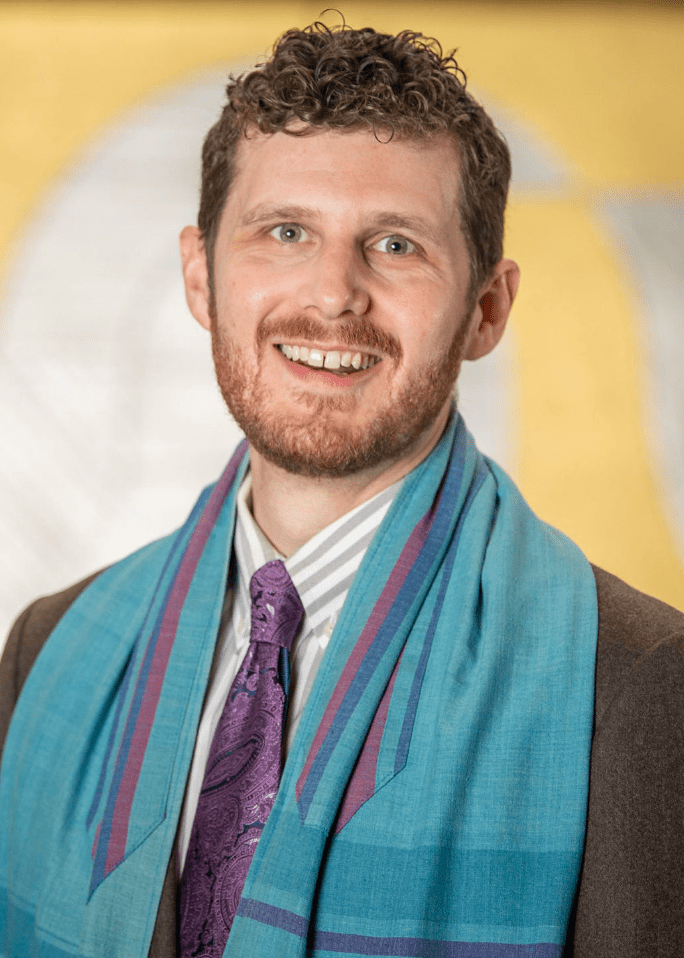Faithful Representation: Going From Musical Theatre to Rabbinical School
For Faithful Representation, an occasional series, Emerson Today spoke with alums and staff members who lead congregations or minister to faith groups to learn about their spirituality, religion, and how Emerson influences them while doing God’s work.
Andrew Oberstein ’09
The Venn diagram of musical theatre majors and rabbis probably makes for a pretty slim overlap, but Andrew Oberstein ’09 fits right in there.

As an assistant rabbi at Temple Israel of Boston, he directs the Riverway Project, a program to connect people in their 20s and 30s to Judaism and each other. In June 2022, he led an online program, What Matters to Me and Why, with Emerson’s Center for Spiritual Life.
“How does someone with a background in musical theater from Emerson become a rabbi? It really is about learning what matters to me and changing what matters to me,” said Oberstein. “You come to Emerson because you sort of know what you want to do, and it’s hard to break out of that.”
Growing up, Oberstein said he heard a lot of voices telling him not to give up on his dreams, so he wanted to stay on track for a career in musical theatre.
As a teenager, he had only considered musical theatre as a career, and that’s why Emerson was so appealing. But after graduating and spending five years acting professionally, he found himself disillusioned.
“I realized I was doing something I didn’t want to do, and I didn’t want to disappoint my 16-year old self,” said Oberstein. “I was excited to share that story with Emerson. I loved being at Emerson. I met my husband there. We have an Emerson sticker on our car.”
Even though theatre changes people’s lives, he felt he wasn’t making a more meaningful impact. He wanted to do something where he could make a bigger difference in the world.
At Emerson, Oberstein said he met a lot of queer folx who felt they weren’t welcome in religious institutions.
One of those people is Oberstein’s husband, Nick Sulfaro ’11. They met while matriculating at Emerson. Oberstein was active in his synagogue, and Sulfaro was disenchanted from his coming out experience while growing up Catholic. As the years passed, religion became more important to the couple, and Sulfaro has since converted to Judaism.
While religion became more of a focus for Oberstein, he didn’t actually know what a rabbi does all day. He learned about the work rabbis do in addition to teaching Torah and leading services: community work such as lobbying at the State House, helping strangers, and being a presence in people’s lives.
“I saw, through my husband and other people, how important it is to have religious voices speaking the language of love, inclusivity, and reaching out to people who have been marginalized [by religions] and letting them know that they are welcome there,” said Oberstein.
Oberstein said his time at Emerson helped him greatly.
“Instead of spending time to get into the headspace of Lady MacBeth, it’s getting into the headspace of Abraham holding a knife towards his son’s neck,” said Oberstein. “This is all text study, this is all trying to understand what’s unsaid, and trying to bring something to life in a vibrant, meaningful way.”
Oberstein said a life goal is to make people understand they don’t need to choose between being queer or having a spiritual life.
“There are spiritual and religious communities not about dogma, and [that] celebrate you for who you are — your sexual orientation or anything like that,” said Oberstein. “That’s not the predominant voice in America. I suppose the average Emerson student wants nothing to do with it.”
Categories